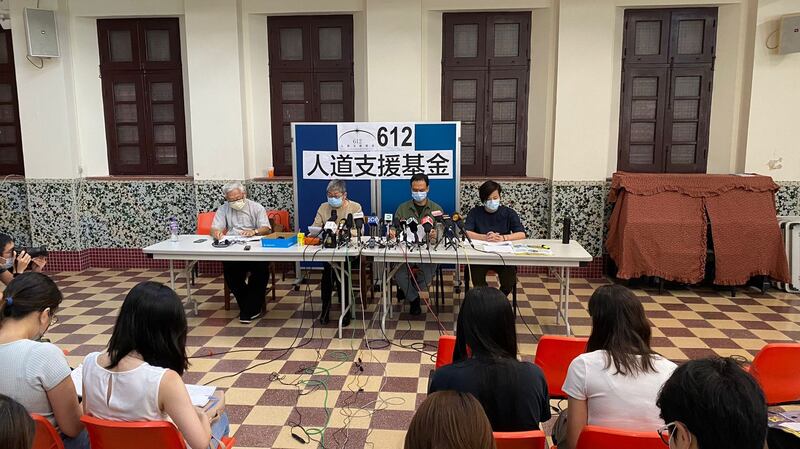A prominent activist who tried to flee Hong Kong for democratic Taiwan and a legal worker have pleaded guilty to charges under a national security law, connected to jailed pro-democracy media mogul Jimmy Lai.
Activist Andy Li, 30, and paralegal Chan Tsz-wah, also 30, are charged with "collusion with foreign forces" alongside Lai.
Li told the court: "I agree to the facts and I would like to say sorry."
Li and Chan allegedly "conspired" with Lai's aide Mark Simon and activist Finn Lau, now in exile, to ask foreign governments to impose sanctions on Hong Kong.
The charge carries a maximum punishment of life imprisonment, and has also been used to target Lai and senior editorial staff at the now-shuttered Apple Daily newspaper.
The case was adjourned until Jan. 3, 2022.
Meanwhile, a relief fund set up to pay bail for those arrested in the 2019 protest movement has announced it will shut down amid a city-wide crackdown on public dissent and political opposition under a national security law imposed by the ruling Chinese Communist Party (CCP).
The 612 Humanitarian Relief Fund said in a statement on its Facebook page that it would cease operations despite strong public donations.
But its banking arrangements were conducted through another group, the Alliance for True Democracy, which is the latest of several civil organizations to wind down since the national security law took effect on July 1, 2020.
"We have been notified by the directors of the Alliance that they intend to wind up in the near future. This means the Fund will no longer have a bank account it can use, and therefore cannot continue to operate," it said.
"We thank the members of the public who have been giving us their unfailing support by their donations and encouragement [as well as] those who have come to us for help in their predicament and their families for the trust they placed in us," it said.

Forced to halt operations
It said it would destroy all personal data linked to donors and beneficiaries.
The Fund had also provided beneficiaries with emergency financial and legal support.
The Aug. 18 announcement came after secretary for security Chris Tang declined to confirm whether or not the 612 Fund is currently under police investigation.
But he said groups that disband could still face investigation.
"Even if these organizations dissolve of their own accord, any crimes they committed won't not be written off," Tang told reporters after the Fund's announcement.
"However, the harm to society would be somewhat reduced if they disband of their own accord," he said.
Tang warned that any organization that promotes violence or has "unusual" financial transactions with foreign organizations will be pursued by police, under the national security law.
Fund trustee and former lawmaker Margaret Ng told a news conference that the Fund had stopped taking any new cases immediately following the announcement.
"The Fund has been forced to cease operations before it was able to complete its mission," Ng said. "I feel deep regret about that, but it was a miracle of historic proportions that the people of Hong Kong were able to create it and bring it this far."
"The 612 Fund is no more," she said. "There are still countless forms of private support, both large and small, but it's not the same."
More arrests expected
Ng said she hadn't heard any news of a police investigation into the Fund's membership, activities or finances so far.
"We can't be too scared or worried about that," Ng said. "All we can do is be very careful not to break the law."
"We must take care every step of the way, and have the banks check our accounts carefully," she said.
At the time of closure, the Fund still had 1,200 live cases on its books, including a 2019 protester identified only as Mr. S.
"Since the protest movement and political upheavals in Hong Kong, there has been no help from the current system," he told reporters. "Young people and people caught up in the political turmoil can only be sure of getting help from civil society groups."
He said police are continuing to investigate cases linked to the 2019 protest movement, and that it is hard to estimate how many more arrests could follow.
More than 100 opposition politicians, activists and protesters have been arrested so far on charges under the national security law, including allegations of secession, subversion and terrorist activities, with more than 10,000 arrested under pre-existing laws for their part in the protest movement.
"They are continuing to prosecute people involved in the movement, so the eventual number is still unknown," Mr. S said. "I think it's sad for the people involved in those future cases."
"They will no longer have access to such solid support from a civil society organization," he said.
However, he said a volunteer-run support hotline would continue to provide advice to those targeted in the ongoing crackdown.
Meanwhile, a Hong Kong court on Thursday ruled that public order charges of the kind frequently used to target participants in the 2019 pro-democracy protest movement can be extended to people who weren't present at the scene.
The city's Court of Appeal found that anyone who encouraged or promoted an "unlawful assembly or riot" could be held liable under the Public Order Ordinance, even if they weren't physically present, under the legal notion of "joint enterprise."
"If there is sufficient evidence to establish their liability... they are no longer innocent people exercising their freedom of expression," the court said.
"They have crossed the permissible line and become a perpetrator to an unlawful assembly or riot and should be held liable as such," judges Jeremy Poon, Andrew Macrae, and Anthea Pang found.
Translated and edited by Luisetta Mudie.
